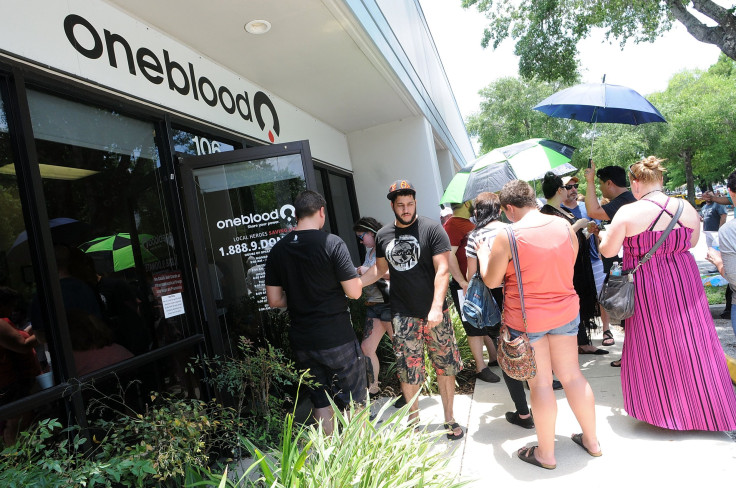Can Gay Men Give Blood? After Orlando Massacre, Activists Renew Calls To Lift Ban Rooted In 1980s AIDS Crisis

The outrage came quickly on Sunday morning after a gunman opened fire at an Orlando, Florida, gay disco, killing 49 people and wounding 53. People around the world were outraged at the loss of life, that it happened during Gay Pride Month, and that one of the few safe spaces for the LGBTQ community had been violated. Another kind of anger came, too: anger that members of that same community were being prevented from helping their brothers and sisters thanks to a decades-long ban on “gay blood.”
Only thing I'd add to saddest tragedy in Orlando: It's made even more tragic and sad that gay men are prohibited from donating blood to help
— Slade Sohmer (@Slade) June 12, 2016
We must overturn the morally bankrupt/dangerous ban on gay people giving blood. Absurd someone can't even donate blood to their own husband?
— (((Jared Polis))) (@jaredpolis) June 12, 2016
Particularly after an event like the massacre in Orlando, the instinct of the community is to take action. “One of the things an act of violence does is make people feel helpless,” Kelsey Louie, CEO of the Gay Men’s Health Crisis in New York, one of the oldest AIDS service organizations, told International Business Times. “The first thing everyone said was, ‘How can we help?’ We want to give, whether that’s financially, with our time, or with our blood. When you can’t take action, that almost doubles the victimization, it compounds the hurt.”
The Food and Drug Administration is the federal agency that issues guidelines for blood donation centers. From 1985 through the end of 2015, its recommendation was that no man who had had sex with another man, ever, since 1977 could donate blood at any point in his life. The purpose of the ban was to prevent the spread of HIV/AIDS, a little-understood disease that, at the time the ban was put in place, was spreading through blood transfusions.
In December, the FDA loosened its restrictions on gay men donating blood. Rather than a lifetime ban for any man who had had sex with another man, men who had sex with another man in the last 12 months would be deferred for a year.
As myriad people pointed out when the FDA released its new guidelines, that is still an effective ban on sexually active gay men, even those in long-term, monogamous relationships. No such restrictions apply to heterosexual people. “The policy still adds to and perpetuates the stigma that HIV is a ‘gay’ disease,” Louie said. “The federal government is telling all gay men that they are inherently dirty.”
And even in its own research conducted before deciding to recommend a 12-month deferral, the FDA discovered that 2.6 percent of male blood donors have had sex with a man, meaning the screening procedures aren’t actually keeping all such men, whether they consider themselves gay or not, from donating blood. Approximately 0.25 percent of these donors were HIV-positive.
The ban on gay men donating blood has its roots in fear, fear of a disease that was ravaging one very specific community at the time. But a lot has happened since 1983 — that very year, a test for the identification of HIV antibodies in the bloodstream was created. Rapid HIV testing has existed since 1992.
LGBT health groups like GMHC and Blood Equality are looking for the FDA to move toward individual donor risk assessments, based on the questionnaires every donor must complete before the needle goes in his arm. This would shift the focus from an entire population to specific behaviors.
For the FDA, there are a few hurdles detailed in the report it released in December 2015, when it announced the 12-month deferral. One of the biggest concerns is potential donors either lying on questionnaires or simply not knowing that their partners have been with other people. “Even if a potential donor is truthful in providing responses regarding his or her own behavior, the response may not be meaningful if a partner has not been monogamous,” the report read.
Currently, donations are tested by pooling anywhere from six to 16 donor samples, rather than every single donation being tested on its own. While testing every donation individually would theoretically be possible, there is still an infection window of nine days in which an HIV infection might go undetected; the FDA estimated that lifting the ban and adjusting to this policy would result in a fourfold increase in HIV transmissions from blood transfusions.
However, the report acknowledges, these hurdles apply to anyone in any kind of sexual relationship, meaning the ban still focuses on a specific group of people. “We want policy based on science and data,” Louie said.
Following the weekend massacre, blood donation centers around Orlando quickly reached capacity, despite the ban. Yet Louie’s observation about the fundamental human need for action in the face of tragedy still holds: “It’s times like this that strengthen our resolve to fight that kind of policy.”
© Copyright IBTimes 2024. All rights reserved.






















